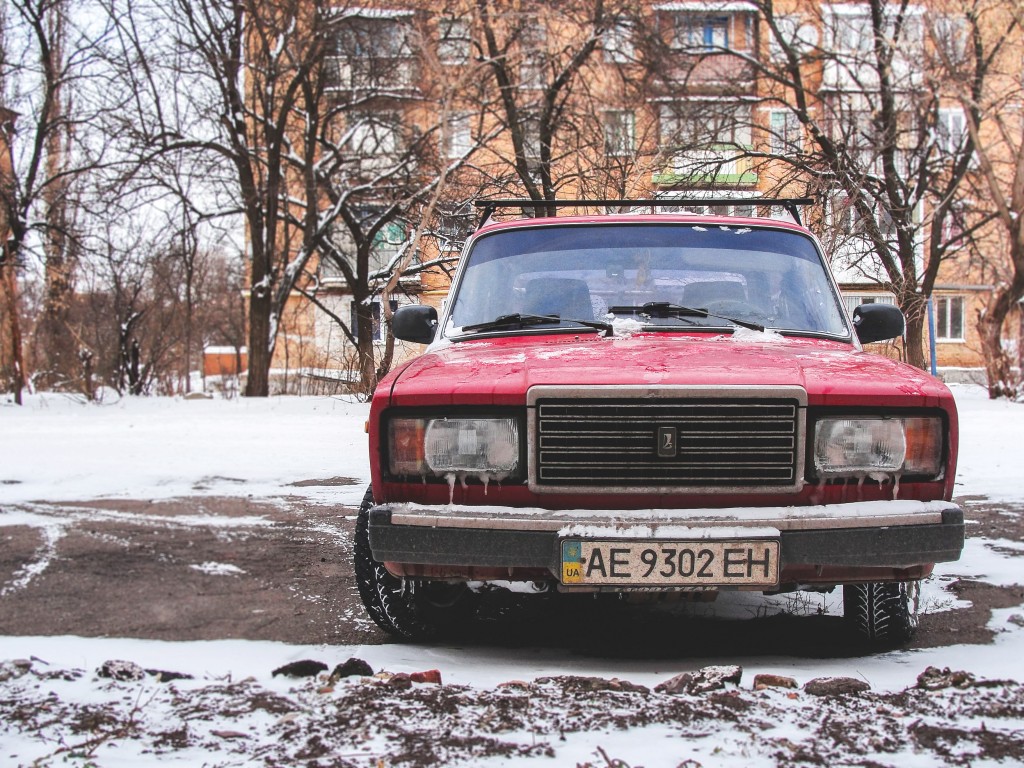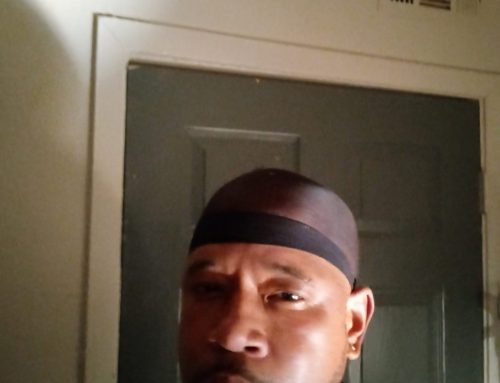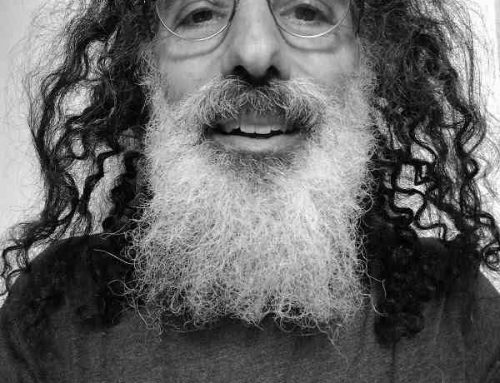
It was rare that my sister, Sandi, and I visited my father at the same time, but that summer things had fallen into place, and we spent the last weeks of July crammed into a trailer five miles outside Belton. The trailer was half a century old, eight feet wide and forty feet long, but the small space was nothing compared to the cab of my father’s white Mazda pickup. I couldn’t remember a time my father didn’t own it.
The three of us tossed our bags in the back and squeezed inside. The contortion of bodies was familiar, an act we had come to cherish. I was ten then, and small for my age, but still taller than my sister despite the four years she had on me. She insisted I sit in the middle, which meant the stick shift rammed into my crotch every time my father switched gears. I learned to anticipate the shift, bracing myself each time he laid off the clutch. The dash itself was dotted with bits of folded paper, each one wedged into a gap that had widened over time. My father was prone to drumming the dash, and this was a poor man’s fix for the rattling it caused.
We sat so close we might as well have been in one another’s laps near the end of its life, the dash rattled so loud we couldn’t hear the radio, which was okay since the speakers were blown. I can’t imagine how many of the miles on the odometer owed themselves to the highway between my mother’s house and his trailer. He never spoke of it, the commute. A single father myself, these days I know too well the toll an empty road can take.
“Dad, you gotta get a bigger truck,” my sister shouted over the radio. She was leaning against the door, my right leg and both her legs fighting for space in the floorboard.
“You gonna buy it for me?” he joked.
“I sure wish I could. You deserve it.”
“I’ll take a Ford. Extended cab with a long bed and a hitch for my Ranger boat.” A running joke.
Every birthday and every Christmas, the same conversation. What do you want, dad? A new truck and a boat to match. He worked overtime every week and picked up shifts at the meat market just to survive. If anybody deserved a new truck, my father did, but we all knew that was a pipe dream. We had never been a family of nice things.
“Someday, dad. Someday I’m just gonna pull up and hand you the keys,” I said.
♦◊♦
We were on the highway to Grandma’s house for the weekend again. She lived just over an hour away. The drive wasn’t long, and it seemed like we went every weekend that summer. Last weekend, my father had seen two older women dressed in their Sunday best on the side of the road. They stood on the other side of the highway, but that didn’t deter my father. He took the first exit and turned back to check on them. We stopped for the third time in as many trips. That was how my father had always been – be it a sandwich or a sofa, my father gave what he had to those in need.
My mother used to tell me that the last straw for her had been the day he gave Grandma their couch. There’s a limit to what you can give, she told me. You’d better be careful or you’ll end up just like him, without a thing in the world to call your own. She was right about that.
“There they are,” my sister said, pointing to a car just up ahead.
We pulled onto the shoulder behind the shiny Cadillac and I saw that one of the rear tires had blown to shreds. We stayed in the truck while he spoke with the women, offering to change the tire. They were sweet as could be and thanked him profusely as he removed the flat tire and moved to mount the spare. He chattered on about something Brother Joe had said in service last week when a loud pop and rush of air shocked him to silence.
“Well I’ll be,” one of the ladies said, “that spare is flat, too!”
“Ma’am, I’m—I’m sorry. This is my fault.” He motioned to the severed valve stem. “I should’ve been paying more attention. I’m awfully sorry. There’s a gas station down the road. I can have them fix it and be back in a few minutes.”
“Well aren’t you a dear,” the other woman said. “You’d do that?”
“I don’t see any other way to get you ladies on the road. And like I said, it’s my fault. I’d like to fix it for you.”
We hung back with the women while my father sped down the road to the gas station. At the time, I couldn’t understand why he felt safe leaving us there. I was ten years old, my sister fifteen, and there we sat on the side of the highway with two strange women while our father went to repair the tire. He always saw the best in people. The women went on about how sweet he was for half an hour before wondering out loud where he might be. Not long after, he pulled back up with the repaired tire and mounted it for them.
“Thank you so much for stopping. How much do we owe you?”
“I didn’t stop for the money, ma’am. I work for the Lord.” If anybody else had said those words, I’d have fallen over laughing. My mother wasn’t religious, and I had always regarded my father’s side of the family as the quirky Southern evangelists. There was arrogance in the way I thought of them, then. Still, my father was as sincere as they come, and his words gave me peace.
“Here, how’s $50? I know it’s not much—”
“Really, ma’am. It’s not necessary.”
“At least let us pay for the repair,” one of the women insisted. “We must have seen a hundred cars pass by before you stopped.”
“No, ma’am. That valve stem was my fault. I couldn’t take your money for it.”
The women tried several more times to give him a check, but he refused. Once they were on their way, he admitted that it had cost him twenty dollars to have the valve fixed. He lived in a trailer because he couldn’t afford rent, put over two hundred thousand miles on a dying pickup and took us to Grandma’s every weekend for hearty meals. But I didn’t have to ask why he wouldn’t let the women pay him back. It wouldn’t have mattered if it had been his fault or not; my father stopped to help, and he told those women the same thing he told every driver he stopped to help: Don’t you worry. God is all the blessing I need.
♦◊♦
“How many you think we’ll stop for this time?” I asked Sandi. We were packing up for another visit to Grandma’s house.
“Three.”
“Three’s a lot. I’m guessing two.”
“Wanna bet?”
“What’ll I get if I win?”
“I’ll wash the dishes for a week. If I win, you’ll wash the dishes and sweep the trailer.”
“Deal.”
“What if I win?” my father chimed in. “What do I get?”
“Nothing. You work for the Lord, remember?” I grinned at him.
“Get these bags loaded up. I’m going to take a quick shower before we head out.” His hands were filthy from his shift at the factory. He looked ridiculous in his stone-washed jean shorts, stained t-shirt and steel-toed boots. Still, it didn’t make much sense to take a shower.
“Dad, why don’t you just wait till we get to Grandma’s?” I suggested.
“It won’t take long, son.”
“I know. I’m just saying, you’ve changed a lot of tires this summer. Stands to reason you’ll change a couple more this trip.”
“So?”
“So you’ll probably get all sweaty and wanna take a shower again at Grandma’s anyway. Might as well wait.” My father stared at me like I’d just quoted a verse he’d never heard. “Doesn’t really matter, I guess. Go ahead and shower. We’ll get the truck loaded.”
“No, you’re right. I didn’t think about all those tires. My head’s been some place else, I guess.”
Inside the truck my sister and I argued about how far we’d get before we saw our first flat. She didn’t think we’d make it out of Belton, but I thought we’d get at least few miles outside of town. We were surprised to travel more than half an hour without seeing a single car on the shoulder. Advising my father to hold off on a shower was starting to seem like bad advice. Perhaps it would be our first trip of the summer without any stops at all.
“Did you see that?” my dad asked, changing lanes and exiting the highway in one fluid movement.
“See what?” my sister asked.
“A wheelchair, I think. I could’ve sworn I saw a wheelchair sticking out of that driver side window.”
Neither my sister nor I had seen anything, but he circled back several miles anyway.
“No, Kyle. I swear I saw—there!” He pointed to a car two hundred yards back. We parked on the edge of the access road and my father walked down the hill to a white sedan. Sure enough, a young man in a wheelchair sat near the front of the car. My father approached him and chatted for a bit. Another flat tire. My father went to work pulling off the flat tire and preparing the spare. A few minutes later, a sheriff showed up to observe, but stood back while my father wrestled with the jack. When he’d gotten everything squared away and put the flat tire in the trunk, he said his goodbyes.
“Sir, I wish I could pay you something. To tell you the truth, I don’t have anything on me,” we heard the young man say.
“Don’t you worry. I work for the Lord,” my father replied in what had become a familiar refrain. He reached for the young man’s hand.
“Well, God bless you, then.”
My father walked back to the truck and climbed in, but he didn’t start the engine. I looked over to see tears streaming from his eyes. My father was always a crier, but these were full-on, chest-heaving sobs.
“Dad, what’s wrong?”
“Nothing, son. These are tears of joy.”
We pulled back onto the highway toward Grandma’s house a few minutes later, my father trying to talk through the crying. He swore the young man had been an angel. His arms were dotted with gooseflesh, chills he called them, a sure sign he’d got the Holy Ghost. He was Pentecostal, so the conversation was familiar. Still, I dismissed it. A paralyzed angel driving an old sedan seemed silly. The sort of story my father tells often.
♦◊♦
For years, that was the summer of spare tires, the summer we stopped every trip down to and every trip back from Grandma’s.
I was well into my twenties before I learned that it was also the summer a friend of his put a shotgun in her mouth. Her landlord hadn’t found her for days. The last thing she had written was a love letter to my father. It should have come as a surprise, but it didn’t. They had drifted apart in the weeks before her suicide because he didn’t share her feelings and she knew it.
My father never let on that he was carrying her death with him on those drives. Again and again we stopped to get strangers back on the road. Perhaps the idea wasn’t so ridiculous after all, an angel waiting on the very road we travelled every Saturday. That was our last trip to Grandma’s before my sister and I went home.
I can’t imagine how quiet the trailer must have been when he returned to it alone, how heavy the silence might have been without that young man, his wheelchair and a handshake that brought my father to tears.
♦◊♦
Years later, he called me out of the blue. I was a freshman at the University of Arkansas, and I hadn’t kept in touch with my parents as often as I would have liked. When I answered the phone, he was already crying.
“What’s going on, dad?”
“Kyle, I’m sitting here on the floor of this goddamned trailer with a gun in my lap and I don’t even know how I got here.”
“Have you been drinking?” Stupid question. He hadn’t had a beer since I was five years old. His words were clear, but I couldn’t make sense of them.
“No. I stopped and got a 12-pack today. I don’t why, either. I don’t even miss it.”
“Well what’s got you down?”
“I don’t know, son. I’m tired, I guess. I’ve been working myself silly for more years than I can count, but it never bothered me before.”
“Have you talked to a doctor?” I tried hard to remain clear-headed, to forget what he had said when I answered the phone.
“Yeah. I told him I’ve been tired and he thinks maybe I’m depressed.” That marked the first time anyone in my family had used that word. My aunt, his sister, went long periods where she seemed to disappear into bedrooms and sleep through holiday get-togethers, but no one ever talked about why. Her daughter started doing the same after her first husband had an affair and they divorced.
I had never mentioned it myself, but I had battled mood swings since grade school. Once, in a seventh grade science class, I pressed a pencil into my wrist until it bled. In ninth grade, I dragged a dull pocket knife across my forearms. My self-harm was impulsive, then. Something I did without thought or understanding.
“Did he give you anything?”
“Yeah, he put me on some anti-depressant.”
“When was this?”
“Oh, about a week or two ago, I guess.”
“I think you oughta call him up tomorrow and tell him about this. Maybe it’s the medicine.”
“You think?”
“I don’t know. Could be. Never hurts to ask.”
“I guess you’re right. I’ll do that. Thank you, son.”
We talked for an hour or so, catching up. Neither of us mentioned the gun or the beer or the depression again that night. I talked him through a rough patch for the first time that night and I was strangely aware that our dynamic had changed. He had gone from mentor to friend almost in an instant. The conversation had opened the door not just to his sadness, but to my own.
♦◊♦
In the weeks after, I read book after book, talked with friends, and even visited the health clinic. I talked openly about my mood swings at family functions. My cousin and I grew close. We traded coping strategies and texted on the bad days. She confided in me that she had been diagnosed with bipolar disorder. No one in the family knew.
She tried to tell her mom, but she wouldn’t hear it. I found myself playing the role of counselor, first with family, then with friends, and eventually with students. I was thirty years old before a doctor came right out and said it to me, but I had come to understand two things: mental illness is genetic, and I have bipolar disorder.
It often strikes new friends and colleagues as odd, but I am not quiet about my mental health. Most assume I am self-diagnosed or speaking hyperbolically, and I understand why. Again and again, I hear them. But you’re so positive. You’re so happy. Of course, these things are not always true, but I am happier than most people I know and I do have an eye for silver linings.
My coping strategy is simple, and it stretches back to that summer and all the tires my father changed. I understand, now, that my father was not just working for the Lord that summer; he was doing the only thing he could do in times of crisis. Like my father, I am at my best when helping others.
He never meant to teach that lesson, but I came home that summer knowing exactly how to change a tire, how to position the jack and lift things up, what to do when it all went wrong.
Ronnie K. Stephens teaches English and English as a Second Language in Texas. He has identical twins and a brand new baby that take up all the space in his chest. In addition to essays and poems, he manages a blog on parenting atDadArms.com.
This post is part of a joint series by The Good Men Project and Stigma Fighters in sharing stories of real men living with mental illness. To submit your story, see below.
—
 Stigma Fighters is an organization that is dedicated to raising awareness for the millions of people who are seemingly “regular” or “normal” but who are actually hiding the big secret: that they are living with mental illness and fighting hard to survive.
Stigma Fighters is an organization that is dedicated to raising awareness for the millions of people who are seemingly “regular” or “normal” but who are actually hiding the big secret: that they are living with mental illness and fighting hard to survive.
The more people who share their stories, the more light is shone on these invisible illnesses, and the more the stigma of living with mental illness is reduced.
For Stigma Fighters’ Founder Sarah Fader’s recent profile in The Washington Post that discusses how more and more people are “coming out” with their mental illness, see here.
 The Good Men Project is the only international conversation about the changing roles of men in the 21stcentury.
The Good Men Project is the only international conversation about the changing roles of men in the 21stcentury.
Mental health and the reducing the social stigma of talking about mental health is and has been a crucial area of focus for The Good Men Project.
As Dr. Andrew Solomon stated during his interview with us, people writing about their own experiences mitigates each of our aloneness in a profound way: “One of the primary struggles in all the worlds I have written about is the sense each of us has that his or her experience is isolating. A society in which that isolation is curtailed is really a better society.”
We are partnering together on this Call For Submissions, because our missions overlap and because we want to extend this conversation further.





Brilliant. Extremely well written and moving. Thank you.